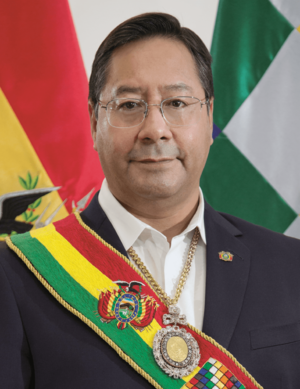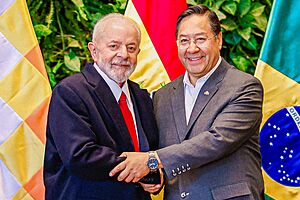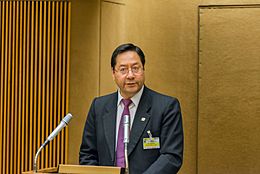Luis Arce facts for kids
Quick facts for kids
The Most Excellent
Luis Arce
|
|
|---|---|

Official portrait, 2020
|
|
| 67th President of Bolivia | |
| In office 8 November 2020 – 8 November 2025 |
|
| Vice President | David Choquehuanca |
| Preceded by | Jeanine Áñez |
| Succeeded by | Rodrigo Paz Pereira |
| Minister of Economy and Public Finance | |
| In office 23 January 2019 – 10 November 2019 |
|
| President | Evo Morales |
| Preceded by | Mario Guillén |
| Succeeded by | José Luis Parada |
| In office 8 February 2009 – 24 June 2017 |
|
| President | Evo Morales |
| Preceded by | Himself (as Minister of Finance) |
| Succeeded by | Mario Guillén |
| Minister of Finance | |
| In office 23 January 2006 – 8 February 2009 |
|
| President | Evo Morales |
| Preceded by | Waldo Gutiérrez Iriarte |
| Succeeded by | Himself (as Minister of Economy and Public Finance) |
| Personal details | |
| Born |
Luis Alberto Arce Catacora
28 September 1963 La Paz, Bolivia |
| Political party | Independent (since 2025) |
| Other political affiliations |
Movement for Socialism (until 2025; disputed in 2023–2024) Socialist Party-1 |
| Spouses |
Jéssica Mosqueira
(divorced)
|
| Children | 3 |
| Parents | Carlos Arce Olga Catacora |
| Education | Mexico School Institute of Banking Education |
| Alma mater | Higher University of San Andrés (BEc) University of Warwick (MEconSc) |
| Occupation |
|
| Signature |  |
Luis Alberto Arce Catacora (born 28 September 1963), often called Lucho, is a Bolivian politician, banker, and economist who served as the 67th president of Bolivia from 2020 to 2025. He is a member of the Movement for Socialism (MAS) party. Before becoming president, he was the Minister of Economy and Public Finance for many years under President Evo Morales.
As economy minister, Arce was known for helping Bolivia's economy grow. He oversaw the government taking control of important industries like oil and gas. During his time, the country's wealth grew, and poverty was greatly reduced. In 2017, he had to leave his job for a while to get medical treatment for a serious illness. He returned in 2019 but resigned later that year during a time of major protests in Bolivia.
After new elections were scheduled for 2020, his party chose him as their candidate for president. He won the election with 55 percent of the vote. As president, Arce focused on fighting the COVID-19 pandemic, helping the economy recover, and strengthening relationships with other countries. His presidency ended on November 8, 2025, and he was succeeded by Rodrigo Paz Pereira.
Contents
Early Life and Career
Luis Alberto Arce Catacora was born on 28 September 1963 in La Paz, Bolivia. His parents, Carlos Arce Gonzales and Olga Catacora, were both teachers. He grew up in a middle-class family and finished high school in La Paz in 1980.
He first studied to be an accountant. Later, he earned a degree in economics from the Higher University of San Andrés in Bolivia. He then went to the United Kingdom to study at the University of Warwick, where he received a master's degree in economics in 1997.
Arce worked for most of his career as a public official at the Central Bank of Bolivia, starting in 1987. He also taught economics at several universities in Bolivia and gave lectures at universities around the world, including Harvard University and Columbia University in the United States.
Minister of Economy
On 23 January 2006, President Evo Morales appointed Arce as the minister of finance. He later became the Minister of Economy and Public Finance. Many people saw him as the main person behind Bolivia's economic success during this time.
He helped the government take control of key industries like oil, gas, and telecommunications. Under his leadership, Bolivia's economy grew much larger, and the number of people living in extreme poverty dropped from 38% to 15%. Because of this success, some magazines named him one of the best economy ministers in the region.
On 24 June 2017, Arce had to step down from his position to travel to Brazil for medical treatment for kidney cancer. After he recovered, he returned to his job as minister of economy on 23 January 2019.
Political Changes and 2020 Election
In late 2019, Bolivia experienced large protests after a presidential election. There were disagreements about the results, which led to a period of political instability. President Morales resigned, and Arce also stepped down from his role as minister. For his safety, Arce was granted asylum in Mexico and later moved to Argentina.
When new elections were called for 2020, the MAS party chose Arce as its presidential candidate. He returned to Bolivia to campaign. He promised to be a steady leader who could unite the country. In the election, Arce won with 55.1% of the vote, defeating former president Carlos Mesa.
Presidency (2020–2025)
Luis Arce was sworn in as president on 8 November 2020. In his first speech, he promised to lead a government for all Bolivians and to work on fixing the economy and fighting the pandemic.
Domestic Policy
Fighting the COVID-19 Pandemic
Arce's government worked to get vaccines for the Bolivian people. They made deals with Russia for the Sputnik V vaccine and with other companies for the Oxford-AstraZeneca and Sinopharm vaccines. This allowed the country to start a national vaccination program.
Arce also spoke at international meetings, asking large drug companies to share their patents for COVID-19 vaccines and medicines. He argued that this would help lower-income countries get better access to life-saving treatments.
Economic Programs
To help people struggling during the pandemic, Arce's government created the "Bonus against Hunger." This program gave a one-time payment of Bs1,000 (about $145) to over four million Bolivians who were unemployed or had low incomes.
His government also created a new law called the Tax on Large Fortunes. This law required the wealthiest people in Bolivia to pay a special tax on their fortunes. The money collected was used to pay for social programs. Under his leadership, Bolivia's economy began to grow again after a difficult year.
Improving the Justice System
Arce's government focused on reforming the country's justice system, especially to protect women and children from violence. A special commission was created to review cases where people felt justice had not been served.
This led to a new law that created stronger protections for victims. It also set tougher punishments for judges, prosecutors, and police officers who failed to do their jobs correctly or acted against victims.
Cultural Policies
As president, Arce brought back the Ministry of Cultures, which had been closed by the previous government. He also made sure the Wiphala, a flag representing the indigenous peoples of the Andes, was included on the presidential sash. This was done to honor Bolivia's diverse cultural heritage.
Foreign Policy

President Arce worked to rebuild relationships with other countries that had changed under the previous government. He restored diplomatic ties with Iran and Venezuela. His government also rejoined several Latin American organizations, such as the Bolivarian Alliance for the Peoples of Our America (ALBA) and the Community of Latin American and Caribbean States (CELAC).
He worked closely with neighboring countries. For example, he made an agreement with Argentina for the sale of natural gas. He also held talks with Chile about Bolivia's long-standing goal of gaining access to the Pacific Ocean.
When the conflict between Russia and Ukraine began in 2022, Bolivia's government chose not to take a side. It called for a peaceful solution and did not vote on a United Nations resolution that condemned Russia's actions. Arce explained that this position was to protect Bolivia's economy and show that it was an independent nation.
2024 Coup Attempt
On 26 June 2024, a group of soldiers led by General Juan José Zúñiga used an armored vehicle to break into the presidential palace in La Paz. This was an attempt to take over the government, known as a coup attempt.
President Arce stood firm against the soldiers and called on the Bolivian people to defend democracy. The attempt failed within a few hours, and General Zúñiga was arrested. Leaders from around the world condemned the coup attempt. After the event, some political opponents, including former president Evo Morales, accused Arce of staging the event to gain popularity, but the government denied this.
Withdrawal from 2025 Election
On 14 May 2025, Arce announced that he would not run for a second term as president in the 2025 Bolivian general election. He said he made this decision to avoid dividing the vote among left-wing parties, which he felt could allow other parties to return to power.
Personal Life
Arce was first married to Jéssica Mosqueira, and they had three children. He is now married to Lourdes Brigida Durán Romero. He can speak English and Portuguese in addition to his native Spanish.
Electoral history
| Year | Office | Party | Votes | Result | Ref. | |||
|---|---|---|---|---|---|---|---|---|
| Total | % | P. | ||||||
| 2020 | President | Movement for Socialism | 3,393,978 | 55.10% | 1st | Won | ||
| Source: Plurinational Electoral Organ | Electoral Atlas | ||||||||
See also
 In Spanish: Luis Arce para niños
In Spanish: Luis Arce para niños
 | George Robert Carruthers |
 | Patricia Bath |
 | Jan Ernst Matzeliger |
 | Alexander Miles |


